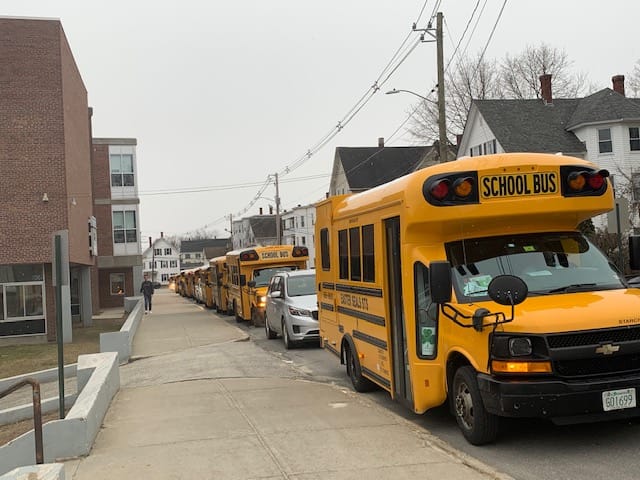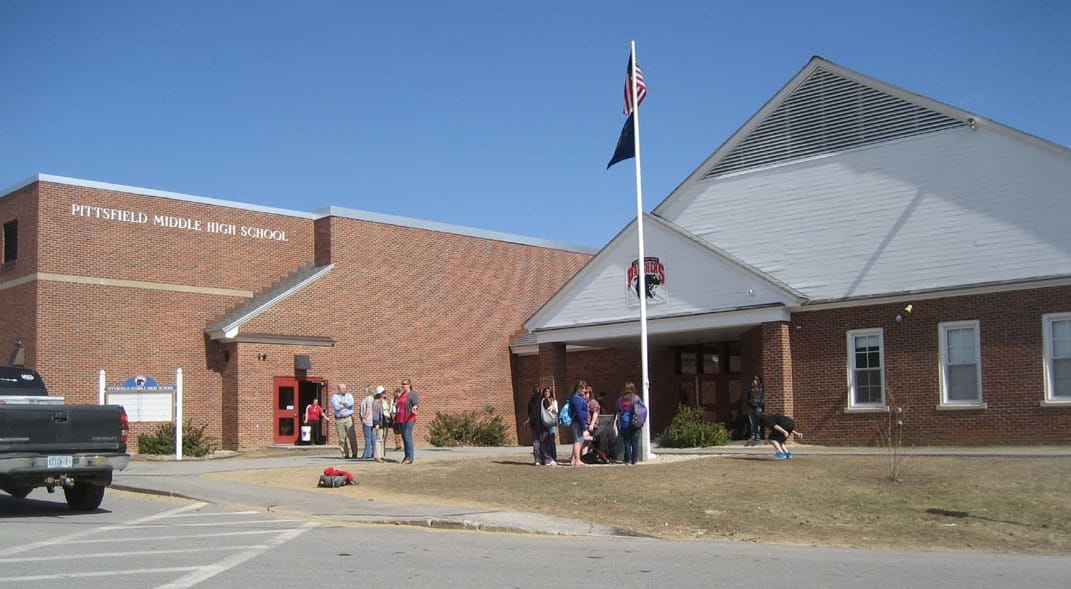Bridging the digital divide: How districts are making remote learning work
The state’s largest school district is relying heavily on school bus drivers to not only bring lunches and breakfast to school children each day but their teachers’ assignments as well.


MANCHESTER, NH — The state’s largest school district is relying heavily on school bus drivers to not only bring lunches and breakfast to school children each day but their teachers’ assignments as well.
Manchester School District Superintendent John Goldhardt said the district is using a hybrid system — paper and electronic — in implementing remote learning, a result of the closing of public schools across the state because of the COVID-19 pandemic.
“It’s been a whirlwind, I tell you that,” he said about what it has taken to ensure the district’s nearly 14,000 K-12 students get needed supplies and assignments. He said teachers worked last weekend to get things readied for the new learning process.
Goldhardt said the district has to rely on the hybrid system because it does not have the infrastructure or hardware that other school districts have.
The paper assignments are being delivered back and forth to the schools by the bus drivers along bus stops. The food deliveries are a way to limit people congregating at the schools.
“It’s a win-win because they’re able to continue working,” said Goldhardt of the school bus drivers. Students with paper assignments do their school work and then return it each day to the bus drivers who, in turn, drop it off at the schools. Teachers then review the paperwork, make comments on it and return them to the bus drivers who drop them off the next day.
The school district is loaning Google Chromebooks to about 800 students without access to a computer. Comcast has offered free Internet service for 90 days to families who can’t afford it and also offered to sell families computers at a heavily discounted price, according to Goldhardt.
Last year, the district purchased 6,800 11-inch Chromebooks for students and another 600, 14-inch Chromebooks for teachers at a total cost of $1.24 million. The computer notebooks are insured in the event they are lost or stolen, Goldhardt said.
For families with multiple kids in school, the school district is providing additional Chromebooks so that the students will not be delayed in doing school work because a sibling is on the computer.
“We don’t want them to have to share one device and have to wait all day to use it,” he said. “We want to make sure they all have access to it during the day.”
As the district works through the process, Goldhardt said it is going to be “clunky. We are going to learn some things and adjust because we haven’t had to do this before.”
He said teachers and leaders “are working really hard and looking at ways to put this together, using resources and analyzing as they go along and adjust as we go along as well.”
Some members of the Greater Manchester Chamber’s Leadership Group contacted the school district to say they are putting together some computers that they are donating and that will be given to students as well.
“The part that’s been the most exciting for me to see is the people who have come forward from the community that has wanted to provide support and help,” he said. “We are extremely grateful. People are calling and saying what can I do to help out.”
Goldhardt said he has no idea if the state of emergency will go beyond April 3.
“We’ll be prepared,” he said. “We prepare for the worst and hope for the best.”
Frank Edelblut, commissioner of the New Hampshire Department of Education, said in an op-ed published by Manchester Ink Link that he was “astounded by the tremendous response of New Hampshire families and educators to this unprecedented challenge. Check the Twitter hashtag #NHLearnsRemotely to see for yourself. Remote instruction plus remote support equal remote learning for our children. We will continue to support our schools and families while keeping our kids healthy and learning.”
For low-income families, he said many schools statewide are providing laptops for their students.
In areas with low broadband coverage, he said “school districts are providing hard copies of materials. Remote instruction does not necessarily mean online, and many schools are using analog methods. School districts are working hard to provide remote instruction and support to students regardless of access to technology.”
On Wednesday, March 18, in Pittsfield, one of the state’s poorest school districts, Chromebooks and mobile hotspots were loaned out to about 100 of the 500 students in the town, according to School Administrate Unit 51 Superintendent John J. Freeman.
He said over the past weekend administrators put together learning materials for all students from pre-school to those attending the Pittsfield Middle High School.

Parents are kept apprised of the plans in online postings on the district’s website. Freeman explained that teachers worked Monday and Tuesday to design remote learning plans, a delivery plan, social education accommodations and Title1 support.
Teachers came up with instructions appropriate to the age, knowledge and skills of their students. Remote instruction is being done through Google Classroom and classroom apps such as Lexia, a literacy and reading app, through email check-ins and interaction with teachers.
Teachers contacted their students/parents prior to last Wednesday to let them know about the process. Curriculum materials, books and equipment were then picked up at the school on Wednesday between 8 a.m. and 3 p.m. and from 5 to 7 p.m.
Information is also being shared on the school district’s Facebook page.
Special educators are working with classroom teachers to integrate supports into classroom assignments. Paras and related service providers are making plans to continue to provide for student needs. Students may be asked to come into school, either individually or in small groups, for some of these services.
School offices and the SAU office remain open during school hours this week but Freeman said the district is preparing to operate remotely if that is required.
Both Manchester and Pittsfield are having custodians clean and sanitize school buildings in anticipation of the students’ return.
Freeman said the parents’ response to the new way of schooling has been rather philosophical.
He said the parents are “kind of rolling with it. It’s what we have to do.” He said everyone is in “fairly good spirits.”
Updates are issued every Monday and Thursday, he said.
The Bedford School District is one that is rolling out the remote learning platform on Monday. Superintendent Michael Fournier said prior to the Governor issuing the state of emergency educators had a conference call with Edelblut. Fournier said, “our interpretation of that call was that everyone was going to start the remote learning on March 23.”
Here is the schedule that we will follow starting next week. Monday March 23, 2020 will be a Silver Day https://t.co/J0zZKz4XJC pic.twitter.com/OJEbQ8pyJg
— Bedford High School (@BHSBulldogs) March 17, 2020
When they saw the proclamation, Fournier said they saw it was more flexible than they thought. On Monday, March 16, he met with faculty at all of the schools and told them to meet with their principals and decide what they wanted to do because originally they were going to go live on St. Patrick’s Day. He asked if they wanted to do a soft roll-out this week or wait until Monday because it was an entirely new learning platform for both students and teachers.
“What we learned was that some teachers were ready to go right away, other teachers were not ready to go and in order to move forward with a united front that everyone would be providing the same level of quality and preparedness, as a district we decided to use this week to make sure everyone was on the same page and start in earnest on the 23rd,” he said.
This week, materials were delivered to families via a drive-through method at the schools. Chromebooks are used yearlong in the Bedford schools with about 3,600 of them purchased by families for their children. Fournier said about 200 Chromebooks were loaned out to those in need.
The only children who don’t have devices are pre-schoolers and kindergartners.
For younger children, principals plan to send parents emails embedded with links to various activities for their kids.
The primary mode of delivery will be through Google Classroom, he said. Currently, Google Classroom has similar capabilities of online learning platforms used by colleges and universities except it is designed for public education, Fournier said.
“Grades 9 to 12 have a feature turned on that allows for video-conferencing,” he said. As of now, Fournier said that feature has not been turned on for the younger grades.
“We’re going to go this first week using Google Classroom and as we become more comfortable, we may ask parents to opt into the video-conferencing feature particularly for those students 13 years of age and younger,” he said. “We just want to be respectful and mindful about how families feel about this new remote learning situation and their kids video-conferencing with teachers.”
Fournier said there has been “an enormous outpouring of support” from parents.
“I can’t begin to tell you how supportive the community of Bedford has been,” he said. “My inbox is absolutely filled with parents who are so pleased with our communication, with our implementation. It was not what I expected at all.”
He said right now things are running smoothly although it’s been a lot of work.
The one complaint he received, he said, was from a parent who wanted a device for a kindergartner.
“Right now we don’t have enough devices to provide to kindergartners so that’s something we’ll address down the road,” he said.
Schools are to be closed through April 3 although Fournier said the district is committed to the remote learning process at least through April vacation, which is the week of April 27.
He said they’d like their juniors and seniors to be able to experience prom and graduation and other activities that take place at the end of the school year.
“We all recognize there’s a likelihood that this may continue and so I would say we are preparing for the inevitability of this being long term,” he said.
He said he was “extraordinarily grateful to our teachers and administrators who have gone above the call of duty.”
He said it was a giant feat to accomplish and without cooperation from everybody, including parents, “we couldn’t do this.”

These stories are being shared by partners in The Granite State News Collaborative. For more information visit collaborativenh.org and follow them at @NewsGranite on Twitter.




